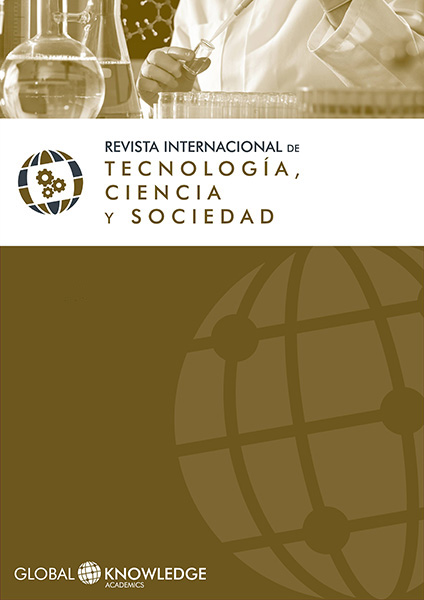The Use of the Social-Humanistic Knowledge Seen from the Information and Communications Technologies
DOI:
https://doi.org/10.37467/gka-revtechno.v5.458Keywords:
Open Access, Social and Humanistic Knowledge, UseAbstract
This article is part of a doctoral research, which examines one aspect of the use of information technology and communications in the first decade of the 21st century, in a given area of knowledge: humanities and social sciences. The objective of the investigations is to demonstrate from this area of knowledge that the reality on the use of these technologies has almost always been on the opposite side, creating new divisions or deepening existing ones. Far from eliminating repeti-tive, boring, tedious work, this area of knowledge improves access to information, training and quality of social justice anddemocracy. The methods used were Observations, Analysis an Synthesis, and Documentary Analysis, especially when apply-ing the technique of content analysis of literature and statistical data. In this work are revealed different uses of the social-humanistic knowledge in digitizing this information using informatics. In the investigation are proposed the methods to employ this knowledge to build a better future from the use of instruments that favor their application. Technology: for whomand for what? Neither the objectives nor the instruments can be neutral with respect to these questions.
References
Acanda, J. L. y Espeja, J.(2006).La preocupación ética. Apuntes de un curso. La Habana, Cuba: Convento de San Juan de Letrán.
Auriat, N. (1998). Las políticas sociales y la investigación social: reapertura del debate. Recuperado de www.unesco.org/issj/rics156/auriatspa.html. Consultado en mayo 2011: UNESCO.
Berlín, Declaración (2003). Recuperado de: http://www.um.es/c/document_library/get_file?uuid=f3736570-bb84-40b3-8a2e-a9397ef7ef30&groupId=793464. Consultadoenenero 2014.
BioMed Central. (2008). Comparison of BioMed Central’s article processing charges with those of other publishers. http://www.biomedcentral.com/info/authors/apccomparison. Consultadoen diciembre de 2013enhttp://www.ricyt.org/interior/interior.asp?Nivech=1&IdiomaInforme
FLACSO (2011). Informe “Las ciencias sociales en América Latica. Retos y perspectivas de desarrollo”. Recuperado dehttp://www.flacso.org/. Consultado en octubre 2013. Journal of Neuroscience, (2012). Recuperado de:http://www.biomedcentral.com/about/apcfaq/apccomparison. Consultadoen enero 2014.
Jover, J. N. (2010). Conocimiento académico y sociedad. En Ensayos sobre política universitaria de investigación y posgrado. La Habana, Cuba: Editorial Universidad de la Habana.
Jover, J. N. (2010). La función social del Conocimiento. La Habana, Cuba: IBERGECYT ́2010, CITMA.
Marx, K.(1976). Tesis sobre Feuerbach. Moscú, Rusia: Editorial Progreso.
Oceguera, R. L.(1998). Los Tanques Pensantes en el Proceso de Conformación de la Política exterior nortemaericana. En El proceso de conformación de la Política Exterior de los EE. UU. La Habana, Cuba: Universidad de la Habana.
RICYT (2014). Indicadores de ciencia y tecnología en Iberoamérica. Recuperado de: http://www.ricyt.org/indicadores. Consultado en diciembre 2013.
RICYT (2011). Estado de la ciencia. Recuperado dehttp://www.ricyt.org/indicadores. Consultado en diciembre 2013.
UNESCO (2011). Informe sobre las Ciencias Sociales en el mundo. Las brechas del conocimiento.
UNESCO (2005). Hacia las sociedades del conocimiento. Recuperado dehttp://www.unesco.org. Consultado en mayo 2012.
UNESCO (2004). Los efectos de las investigaciones en la política: Monografías en torno a los vínculos entre ciencias sociales y políticas públicas. Revista Internacional de Ciencias Sociales, 179. UNESCO.
Vessuri, H. (2008). El futuro nos alcanza: mutaciones previsibles de la ciencia y la tecnología. En A. Gazzola y A. Didriksson (Eds.), Tendencias de la Educación Superior en América Latina y el Caribe. (pp.55-86). Caracas, Venezuela:IESALC.
Downloads
Published
How to Cite
Issue
Section
License
Those authors who publish in this journal accept the following terms:
- Authors will keep the moral right of the work and they will transfer the commercial rights.
- After 1 year from publication, the work shall thereafter be open access online on our website, but will retain copyright.
- In the event that the authors wish to assign an Creative Commons (CC) license, they may request it by writing to publishing@eagora.org







